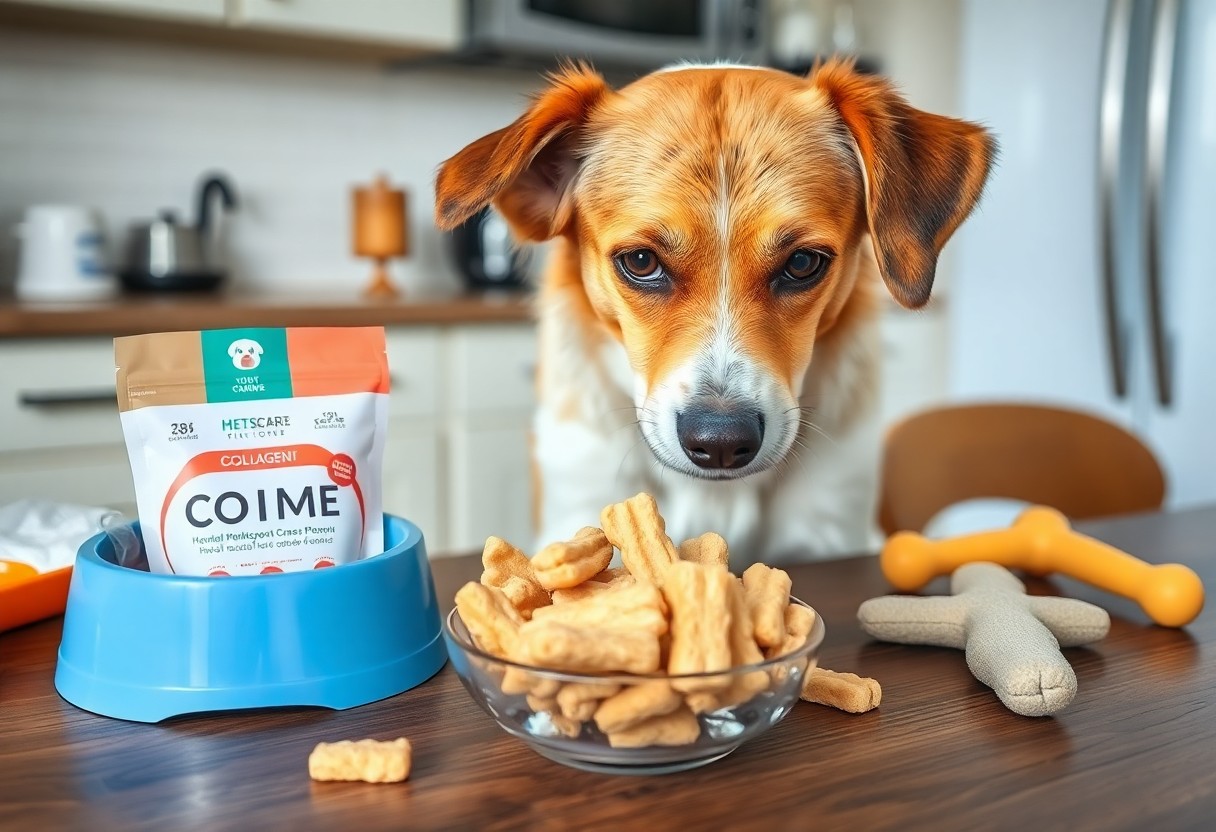Are Collagen Chews Safe for Dogs?

Just like you, your furry friend deserves the best when it comes to their health and nutrition. When considering collagen chews for dogs, it’s imperative to evaluate their safety, benefits, and potential risks. While these chews can support joint health and promote a shiny coat, they may also pose risks if not made from high-quality ingredients or if your dog has certain dietary restrictions. In this post, we’ll explore whether collagen chews are a safe and effective option for your canine companion.

Key Takeaways:
- Ingredients Matter: Ensure that collagen chews do not contain harmful additives, artificial sweeteners, or other toxic substances for dogs.
- Dosage Guidelines: Follow recommended dosage instructions based on your dog’s size and weight to prevent potential gastrointestinal issues.
- Consult Your Vet: Always talk to your veterinarian before introducing new supplements to your dog’s diet, especially if they have existing health concerns.
Understanding Collagen and Its Benefits for Dogs
The importance of collagen in your dog’s diet cannot be overstated. This vital protein plays a significant role in maintaining the health of your pet’s joints, skin, and overall well-being. As your dog ages, natural collagen production decreases, potentially leading to health issues. Providing collagen, particularly through chews, can help support your dog’s vitality and comfort, ensuring a happier life as they advance in years.
What is Collagen?
After being the focus of various health discussions, collagen is now recognized as a fundamental protein that serves as a building block in your dog’s body. It is primarily found in connective tissues, such as cartilage, tendons, and ligaments, and plays an necessary role in keeping these structures strong and flexible. By incorporating collagen into your dog’s diet, you can support healthy tissue maintenance and repair.
Health Benefits of Collagen for Dogs
Collagen offers remarkable benefits for your dog’s health. This protein aids in joint support, promoting flexibility and mobility, which is particularly beneficial for active dogs or those with arthritis. Additively, collagen enhances skin elasticity and can help alleviate common skin issues, ensuring your dog’s coat remains shiny and healthy. Regular consumption of collagen chews can also support gut health, aiding digestion and maintaining a healthy microbiome.
Health professionals emphasize the importance of collagen not just for mobility but also for enhancing your dog’s overall quality of life. By including collagen in their diet, you may notice improved joint function and reduced inflammation, leading to increased activity and a more vibrant demeanor. Additionally, collagen’s role in skin and coat health can reduce shedding and improve the appearance of your dog’s fur. Ultimately, integrating collagen into your pet’s nutrition can support their long-term health and vitality.

Safety Concerns Related to Collagen Chews
While collagen chews can be a delicious treat for your dog, it’s necessary to weigh the safety concerns associated with them. Be cautious about the ingredients, the chew’s size, and your dog’s chewing habits. Some dogs may struggle to digest these chews, leading to potential choking hazards. If you’re uncertain about your choices, check out Collagen Sticks vs Bully Sticks: Which Is Best For Your … for more insights.
Allergies and Sensitivities
Sensitivities to ingredients in collagen chews can arise in some dogs, potentially causing digestive upset or allergic reactions. Keep an eye on your dog after introducing new treats, especially if they have known food allergies.
Ingredient Quality and Sourcing
Above all, the quality and sourcing of ingredients in your dog’s collagen chews matter significantly. Look for products that clearly state their sourcing practices and ingredient transparency.
Another vital aspect is to ensure you choose brands that prioritize high-quality ingredients and detailed sourcing information. Low-quality collagen chews might contain harmful additives or fillers that could adversely affect your pet’s health. Prioritize options with natural ingredients and reputable sourcing to ensure the safety of the treats you give to your furry friend. Your dog’s well-being should always come first when selecting their treats.
Recommended Dosage for Dogs
Keep in mind that the recommended dosage for collagen chews can vary based on your dog’s size, weight, and health condition. Typically, smaller dogs require fewer chews, while larger breeds may need more. It’s best to consult your veterinarian for personalized advice. For additional insights, check out this discussion on Are collagen chews/sticks actually more digestible and…
Factors Influencing Dosage
After considering the ideal dosage, several factors can influence how much collagen you should give your dog:
- Dog’s Weight: Heavier dogs may need more chews.
- Health Issues: Dogs with joint problems might benefit from higher doses.
- Activity Level: Active dogs often require additional nutritional support.
Knowing these factors will help you ensure the right balance for your dog’s health needs.
Signs of Overconsumption
Behind any dietary change, it’s important to monitor your dog for signs of overconsumption. If your dog is experiencing digestive discomfort, such as vomiting, diarrhea, or excessive gas, it may be consuming too many collagen chews. Other alarming signs include a sudden change in behavior like lethargy or a lack of appetite, which should prompt immediate consultation with your veterinarian.
At the first indication of these issues, it’s wise to reassess your dog’s collagen chew intake. Frequent or excessive consumption can lead to serious consequences, such as gastric upset or even more severe gastrointestinal issues. Always prioritize your dog’s health and well-being by adjusting their dosage as needed.

Reviews and Feedback from Dog Owners
All pet owners are eager to share their experiences with 7″ Easy Chew Collagen Sticks – Bully Flavor. Their reviews often highlight the positive impact of collagen chews on their dogs’ joint health and overall well-being. Many owners have noted enhanced mobility and less stiffness in their furry friends after introducing these treats into their diets. This positive feedback indicates a growing satisfaction among dog owners seeking to improve their pet’s health with these supplements.
Positive Experiences
Across various reviews, dog owners consistently report that their pets enjoy the taste and texture of collagen chews. Many have observed improvements in their dogs’ coat quality, along with increased energy and enthusiasm during playtime. These positive experiences reinforce the idea that collagen supplements can be a beneficial addition to your dog’s diet.
Negative Outcomes
Any product can have its drawbacks, and some dog owners have reported concerning reactions after giving their pets collagen chews. Instances of digestive upset and allergic reactions have occurred in a small number of dogs, leading some owners to question the safety of these treats.
In fact, while most pets handle collagen chews well, it is important to monitor your dog for any signs of adverse effects. If you notice symptoms like vomiting, diarrhea, or signs of an allergic reaction, it’s wise to discontinue use and consult your veterinarian. Always consider your dog’s specific dietary needs and any pre-existing conditions before introducing new treats. Your pet’s health is of utmost importance, so stay informed and proactive in ensuring their safety.
Alternative Options to Collagen Chews
Unlike collagen chews, which can sometimes contain artificial ingredients or sugars, there are various alternative options you can consider for your dog’s joint health. These options may be more natural and free from potential harmful additives, giving you more control over your pet’s nutrition. Always consult with your veterinarian before introducing new supplements to ensure they align with your dog’s specific health needs.
Natural Sources of Collagen
Among the natural sources of collagen, bone broth stands out as an excellent option. Rich in nutrients, it not only helps support joint health but can also be easily incorporated into your dog’s diet. You can either make bone broth at home using leftover bones from meals or purchase high-quality, ready-made versions specifically formulated for dogs.
Other Supplements for Joint Health
Alternative supplements, such as glucosamine and chondroitin, are widely used to support your dog’s joint health. These ingredients work synergistically to provide structural support and promote mobility in your pet.
Supplements like glucosamine hydrochloride and chondroitin sulfate are highly regarded for their ability to support joint function and reduce inflammation. These natural compounds can help maintain cartilage health, particularly in older dogs or those with joint conditions. When considering these options, look for products formulated specifically for dogs, as they ensure the correct dosage and quality. Combining these supplements with a healthy diet can significantly improve your dog’s overall mobility and quality of life. Always check with your vet to determine the best regimen for your furry friend.
Consulting with Your Veterinarian
Once again, before introducing collagen chews into your dog’s diet, it’s crucial to consult with your veterinarian. They can evaluate your dog’s specific health needs and conditions, ensuring that these supplements are suitable for their dietary habits and overall well-being. Your vet will help guide you in making informed decisions that prioritize your pet’s health.
Importance of Professional Guidance
Consulting with your veterinarian provides you with crucial insights about your dog’s unique nutritional requirements. They can help you understand how collagen may impact your dog’s health and identify potential allergies or sensitivities that could arise from new ingredients.
Questions to Ask Your Vet
An effective consultation includes asking specific questions about the safety and benefits of collagen chews. Make sure to inquire about how these treats can complement your dog’s diet and whether there are any known interactions with other supplements or medications.
Even if your dog appears healthy, it’s vital to ask your vet the right questions. For instance, inquire about the appropriate dosage for your dog’s size and weight, any potential side effects to watch for, and whether these chews can safely be integrated with other foods or supplements. This way, you can make informed choices that promote your dog’s long-term health.
To wrap up
To wrap up, collagen chews can be a safe and beneficial supplement for your dog when chosen wisely. It’s important to select high-quality products that have undergone testing for safety and efficacy. Always consult your veterinarian before introducing new treats into your dog’s diet, especially if they have any underlying health conditions. By making informed choices, you can support your dog’s joint health and overall well-being with collagen chews that fit into their nutritional needs.
FAQ
Q: Are collagen chews safe for dogs to consume?
A: Yes, collagen chews can be safe for dogs when given in moderation and chosen carefully. It is important to select products that are specifically formulated for canine consumption. Always check for any harmful ingredients or additives, and consult with your veterinarian if you have concerns about your dog’s specific health needs or dietary restrictions.
Q: What benefits do collagen chews provide for dogs?
A: Collagen chews can offer several benefits for dogs, particularly for joint health and skin condition. Collagen is a protein that can help support the structure of connective tissues, which may lead to improved joint mobility and reduced discomfort in aging or active dogs. Additionally, collagen can promote healthy skin and a shiny coat, making it a beneficial supplement for many canine diets.
Q: How should I introduce collagen chews to my dog’s diet?
A: When introducing collagen chews to your dog’s diet, start with a small amount to monitor any potential adverse reactions, such as gastrointestinal upset. Gradually increase the dosage as tolerated, following the serving instructions provided by the manufacturer. It is wise to consult your veterinarian before adding any new supplements to ensure it aligns with your dog’s overall health plan.





